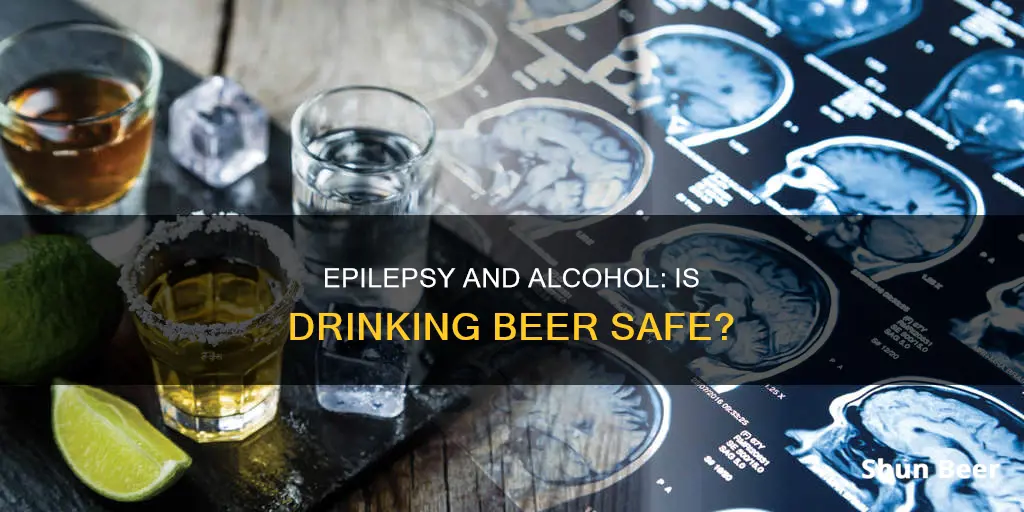
Drinking alcohol is a common seizure trigger for people with epilepsy, and doctors often advise against it. Alcohol interacts with anti-seizure medications, and withdrawal from alcohol can also lead to seizures. However, some people with epilepsy may still choose to consume small amounts of alcohol, such as the occasional beer, which is usually considered safe.
| Characteristics | Values |
|---|---|
| Alcohol consumption and epilepsy | Alcohol can trigger seizures in epilepsy patients, especially in cases of binge drinking or alcohol withdrawal. |
| Alcohol and anti-seizure medication | Alcohol can interact with anti-seizure medication, reducing its effectiveness and increasing the risk of seizures. |
| Alcohol and sleep patterns | Alcohol can disrupt sleep patterns, and poor sleep is a common trigger for seizures. |
| Alcohol and dehydration | Alcohol is a diuretic, which can lead to dehydration, a common trigger for seizures. |
| Alcohol and brain activity | Alcohol can directly change brain activity, increasing the likelihood of seizures. |
| Alcohol and blood sugar levels | Alcohol can cause changes in blood sugar levels, which may contribute to seizure development. |
| Recommendations | Experts recommend that epilepsy patients avoid binge drinking and alcohol abuse. Moderate alcohol consumption may be acceptable for some individuals. |
What You'll Learn
- Alcohol and anti-seizure medication don't mix well together
- Excessive drinking can reduce the amount of epilepsy medicine in the body
- Alcohol can cause withdrawal seizures
- Alcohol can increase the risk of SUDEP (Sudden Unexpected Death in Epilepsy)
- Alcohol can cause dehydration, which is a common seizure trigger

Alcohol and anti-seizure medication don't mix well together
Drinking alcohol while taking anti-seizure medication can increase the risk of seizures in several ways. Firstly, alcohol can make you more sensitive to the sedating effects of anti-seizure medication, leading to increased drowsiness or intoxication. Secondly, it can reduce the effectiveness of the medication and increase its side effects by affecting how the medication is metabolised, which in turn increases the risk of seizure activity. Thirdly, excessive drinking can lead to missed medication, late nights, sleep deprivation, and missed meals, all of which can lower your seizure threshold and trigger seizures.
Additionally, drinking alcohol while taking anti-seizure medication can be dangerous due to the similar side effects of both substances. Both alcohol and anti-seizure medication can affect awareness, reflexes, and coordination, making activities like driving especially hazardous even if you are within the legal limit for alcohol consumption.
It is important to note that the impact of alcohol consumption on individuals with epilepsy varies. People with certain types of epilepsy may be more likely to have seizures as a result of drinking alcohol than others. For example, those with generalized seizures are more likely to experience alcohol-related seizures than those with focal seizures.
If you have epilepsy and are considering consuming alcohol, it is crucial to consult your doctor or pharmacist to understand the specific risks associated with your medication and epilepsy type. They can provide personalised advice and help you make informed decisions about alcohol consumption.
Hunting Island State Park: Beer Drinking Rules Explained
You may want to see also

Excessive drinking can reduce the amount of epilepsy medicine in the body
Excessive drinking can lead to a reduction in the amount of epilepsy medication in the body. This is because the body processes certain anti-seizure medications faster when alcohol is present, which could lead to a breakthrough seizure. Additionally, drinking excessively can cause vomiting, which may affect the levels of medicine in the body, making them less effective in controlling seizures. It is important to note that some epilepsy medications should never be mixed with alcohol, as the combination can be dangerous and affect vital functions such as heart rate and breathing.
Furthermore, excessive drinking can increase the side effects of epilepsy medications. Many seizure drugs have sedative effects, and when combined with alcohol, individuals may feel 'drunker' faster than usual. This can impair coordination, reflexes, and awareness, making activities like driving extremely hazardous. Excessive drinking can also lead to missed medication, sleep deprivation, and dehydration, all of which are seizure triggers and can lower the seizure threshold.
It is crucial for people with epilepsy to understand the risks associated with alcohol consumption and how it can affect their specific medication and condition. The leaflet that comes with epilepsy medication should provide information on possible interactions with alcohol, and healthcare professionals can offer personalised advice on safe drinking limits.
Beer Drinking: Daily Habit to Alcoholism?
You may want to see also

Alcohol can cause withdrawal seizures
Alcohol withdrawal can cause seizures, even in people without epilepsy. When someone regularly consumes large amounts of alcohol, their brain chemistry adapts to the depressant effects of alcohol. This involves changes in neurotransmitter levels, particularly gamma-aminobutyric acid (GABA) and glutamate, which help regulate brain activity.
When alcohol consumption is abruptly stopped, the brain's chemistry is thrown off balance. The absence of alcohol's depressant effects leads to an overexcitation of the nervous system as the brain continues to produce higher levels of excitatory neurotransmitters like glutamate. This hyperactivity can result in seizures—sudden, uncontrolled electrical disturbances in the brain.
Tonic-clonic seizures, also called convulsions, are the most typical and severe type of alcohol withdrawal seizure. They usually occur within 48 hours of the last drink but could happen at any time during the first week of withdrawal. Tonic-clonic seizures generally begin on both sides of the brain, but they can start on one side and spread. All muscles become stiff, and the air forced through the vocal cords causes a cry or groaning sound. The individual loses consciousness, falls, and may bite their tongue or the inside of their cheek. After the tonic phase, the clonic phase begins, with rapid and rhythmic jerking of the arms and usually the legs, bending at the hips, knees, and elbows. The person's awareness slowly returns after the jerking slows and stops.
Delirium tremens (DTs) is another severe consequence of alcohol withdrawal. It typically occurs about 3 to 5 days after the last drink and can be life-threatening. Symptoms include severe and sudden changes in mental or nervous systems, uncontrollable tremors, extreme confusion, hallucinations, a racing heart or irregular heartbeat, and elevated blood pressure.
The risk of alcohol withdrawal seizures increases with repeated detoxes and relapses, known as the "kindling effect". This is because every withdrawal incident acts as an irritation to the brain, and the accumulation of these incidents lowers the threshold for seizures.
Beer and Cutting: Friends or Foes?
You may want to see also

Alcohol can increase the risk of SUDEP (Sudden Unexpected Death in Epilepsy)
Alcohol is a common seizure trigger for people with epilepsy. Drinking alcohol can have serious consequences for people with epilepsy, and doctors often advise against it or recommend drinking in moderation. While small amounts of alcohol do not cause seizures, binge drinking and alcohol withdrawal can lead to status epilepticus, a potentially fatal condition.
People with epilepsy who consume large amounts of alcohol have a higher risk of seizures. Alcohol withdrawal can cause seizures, and consuming higher amounts of alcohol is associated with a higher risk. Alcohol withdrawal seizures typically occur 6 to 72 hours after stopping drinking.
Alcohol abuse is a medical problem that can increase the risk of developing epilepsy. Long-term heavy alcohol consumption is associated with a higher risk of epilepsy. Alcohol can directly change brain activity and affect anti-seizure medications, leading to increased seizure frequency.
Additionally, alcohol is a risk factor for SUDEP (Sudden Unexpected Death in Epilepsy). People with a history of alcohol misuse have a greater risk of SUDEP than those without such a history. A 2020 study found that people with epilepsy were five times more likely to die from alcohol-related causes than those without epilepsy.
To summarise, alcohol can increase the risk of SUDEP in people with epilepsy. It is essential for individuals with epilepsy to be aware of the risks associated with alcohol consumption and to make informed decisions regarding their alcohol intake.
Beer and Athletes: A Performance-Draining Combination?
You may want to see also

Alcohol can cause dehydration, which is a common seizure trigger
Alcohol is a diuretic, which means it increases urine output and promotes water loss. This can make you more prone to dehydration. Dehydration is a common seizure trigger for people with epilepsy.
Alcohol can also affect sleep patterns, and poor sleep is another common seizure trigger. In addition, excessive drinking can lead to missed medication, late nights, sleep deprivation, and skipped meals, all of which can lower the seizure threshold and trigger seizures.
It is important to note that binge drinking and heavy alcohol use are associated with a higher risk of seizures in people with epilepsy. Therefore, it is recommended that people with epilepsy avoid consuming large amounts of alcohol and instead drink in moderation if they choose to drink.
Furthermore, alcohol can interact with anti-seizure medications, reducing their effectiveness and increasing the risk of seizure activity. It is always a good idea to consult with a doctor or pharmacist to understand the risks and make informed decisions about alcohol consumption.
Beer and Paxlovid: Is It Safe to Drink?
You may want to see also
Frequently asked questions
Doctors often advise people with epilepsy to avoid drinking beer and other alcoholic drinks. Alcohol is a common seizure trigger, and can interact with anti-seizure medications. However, some sources say that drinking a small amount of beer is unlikely to cause seizures.
Drinking beer can increase the risk of seizure activity, especially in people with types of epilepsy that don't respond well to antiseizure medications. Alcohol can also affect sleep, blood sugar levels, and interact with medications. Additionally, excessive drinking can lead to missed medication, sleep deprivation, and dehydration, all of which can trigger seizures.
There is no one-size-fits-all answer to this question as everyone is different. However, heavy drinking is generally defined as more than eight drinks per week for women and more than 15 drinks per week for men. Binge drinking is considered more than five drinks on one occasion for men and more than four drinks for women. Epilepsy patients should also be aware of the risks associated with alcohol withdrawal, as seizures often occur within 6-48 hours after stopping drinking.







